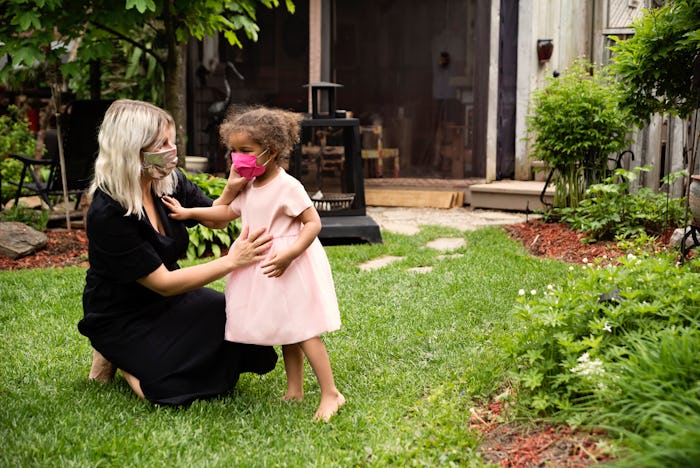Life

How To Deal With Anxiety Over Sending Your Kids Back Out After Quarantine
Just like the beginning of quarantine was stressful for parents, the end of stay-at-home orders comes with its own set of worries. It wasn't easy figuring out how to work full-time from the living room while homeschooling your kids, and it won't be easy preparing yourself to bring them back out into the big world. So how can you deal with anxiety over sending your kids out after quarantine?
It can be hard if you feel like the only one who's not sending their kids to activities, or if you feel pressure from a friend to send your child so their kid has a buddy. "Every family has to make their own decisions and assess risks depending on their family's health and needs," New York-based child psychotherapist Jodi Aman, LCSW, tells Romper. If you're planning a playdate or a small outing with one friend, you'll likely feel less anxious if you speak candidly with the other parent beforehand. "It's important to find out if your ideas of social distancing align," Aman says. "Remember that if you're not aligned, you can decide to say no."
Anxiety isn't always a bad thing. "It can often function as an early warning system or indicator that something isn’t right," perinatal mental health and relationship expert Kirsten Brunner MA, LPC, tells Romper. "If your gut says it isn’t a good time to return, you might want to listen to your gut. That being said, I think it is wise for parents to closely evaluate the data, statistics, and guidelines in their own community."
It's possible that parents are feeling anxiety over details that are "irrelevant to their specific situation," she adds. If this is the case for you, there are ways to challenge your fears. Pay attention to the case count in your area, and don't be afraid to ask the camp, daycare, school, or activity director about the hygiene precautions they're taking to keep students safe. Clarify anything that doesn't make sense. Collect as much helpful information as you can, and try (though it's hard) not to compare what your family is doing to how other families are choosing to navigate this time.
If you’re still deciding whether or not to send your child to camp, daycare, or another organized social activity, it’s best for the time being to keep them out of conversations that might make them more worried. “While adults can differentiate between imagined, real, and hypothetical threats, kids tend to interpret all threats as very real and unavoidable," Brunner says. “If a parent is having a hard time getting their own anxiety under control, they might want to reassess whether they are ready to send their kid to a particular camp or school at this time, and whether the facility is taking necessary and recommended COVID precautions.”
“Before approaching your child about going [out], you should make the decision on if you are comfortable with sending them,” Aman agrees. “Kids can read your energy," she adds. So if you make the decision to send your kids because "you need childcare and unfortunately don't have a choice but are still anxious," then you need to make peace with the decision yourself before telling your kids about the plan.
Of course, there will be times when you have to take your child somewhere, like a doctor or dentist appointment. Most places like these are taking more serious safety precautions than "optional" destinations (like the store), Aman says. "When you go, however, if something feels off or out of place, it is okay to give that feedback and reschedule if you are not comfortable."
And if your child is having a hard time getting comfortable with a new situation, take the time to address their feelings. "I encourage parents to validate and normalize their child’s worries. We’ve been hearing non-stop about this virus so it is normal to feel anxious and scared," Brunner says. Going out and seeing friends (even if it's from 6 feet away) is likely a major change in your child's day-to-day, and they could be feeling some social anxiety in addition to fears about getting sick. Explain all the safety precautions that are being taken and remind them of steps they can take themselves (like washing hands regularly and not sharing food) to make them feel a little more in control. Remind them of how much fun they used to have playing with their friends. And remember, no decision is final; if you think you're okay with sending your little one out and it ends up feeling stressful for both of you, you can make a different decision the next day.
If you think you’re showing symptoms of coronavirus, which include fever, shortness of breath, and cough, call your doctor before going to get tested. If you’re anxious about the virus’s spread in your community, visit the CDC for up-to-date information and resources, or seek out mental health support. You can find all of Romper’s parents + coronavirus coverage here.
Experts:
Jodi Aman, Child Psychologist With Tilleo.com
Kirsten Brunner MA, LPC, and perinatal mental health and relationship expert
This article was originally published on